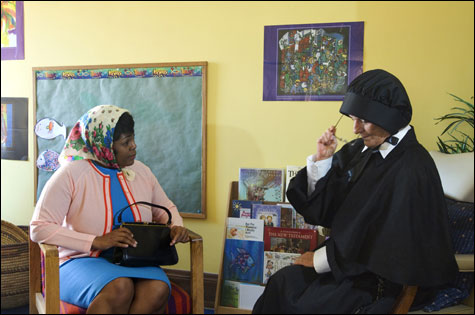
Young teacher Sister James (Kate Turnbull) receives some bewildering wisdom from her two foiling superiors. “Innocence is a form of laziness,” advises acerbic old principal Sister Aloysius (Cristine McMurdo-Wallis), while affable young Father Flynn (Timothy Deenihan) tells her that “doubt can be a bond as powerful and as sustaining as certainty.” Caught between two strong personalities, between tradition and modernism, and between the realms of women and of men — Sister James wakes to the grays of good, faith, and motivation, in John Patrick Shanley’s Pulitzer- and Tony-winning Doubt, produced under the taut direction of Sally Wood at Portland Stage Company.

It’s 1964, and the forces that have begun shaking up the sureties of the secular world — a presidential assassination, the Civil Rights Movement, and rock ’n roll, all nicely evoked in an opening photo montage — are also causing tremors within the convent and rectory walls of St. Nicholas, in the Bronx. Among other things, Sister Aloysius bemoans ballpoint pens, despairing that “penmanship is dying all across the country.” To her further dismay, Father Flynn (who writes with one of those despicable ballpoints) proposes including a secular song in the Christmas pageant. These trivialities are symptoms of their larger splits in ideology and personality. Hard Sister Aloysius is feared by all the kids, while Flynn is warm and adored — especially by the boys. And in one vulnerable student — the school’s first black boy — Flynn appears to have taken a special interest. Though Sister Aloysius has no proof, she is certain of the priest’s impropriety.
The play’s action takes place completely within the sacral gray stone walls of St. Nick’s: the tall chapel in which Father Flynn preaches, the institutional office of Sister Aloysius, the garden courtyard between the convent and the rectory. Between Daniel Bilodeau’s scene design and Lynn Chase’s lighting, these settings are masterfully wrought — at once inspiring and insulated, beautiful and bleak. Clear, fluid light filters through the high filigree of cathedral windows, splaying shadows below.
Within the stark enclosures of the church, Wood’s excellent blocking manifests both the conviction and the restless unsurety of these characters. From firm, still stances, they reel into motion, pacing and repositioning as if on a chessboard or through their own troubled psyches. This is the same agonized movement of their inner thoughts, which these actors convey with both intensity and measure. Their crescendos and breaks from civility to hostility and hurt, as they circle and confront each other, are acute. Deenihan’s likable Flynn has great nuance, and gives glimpses into the many grays of his emotions and motivations. Though unyielding Sister Aloysius is less wont to reveal her gradations, McMurdo-Wallis does a superb, understated job rendering layers to her acidity and to the depth of her unspoken thoughts. And as the much more forthcoming Sister James, Turnbull gives a wise balance of emotion and restraint, creating a coming-of-age arc that is intelligent and affecting.
A fourth actor, Tamela Aldridge, gives another strong performance in a critical role, the only character from the outside world: Mrs. Muller, the mother of the school’s black child, is called in for a meeting with Sister Aloysius. Over the course of the brief interview, as they discuss the circumstances of her boy’s life, her tenor veers from pleasantries to desperation, and it is a powerful portrayal. This scene is a crux of the play, bringing home key realities and ambiguities of race, gender, and faith, and Aldridge gives it an electrifying impact.
As its title suggests, Doubt offers no firm reassurances or answers, and this production does a brisk, gripping job of heightening the emotional and intellectual stakes. Shanley’s lean and economical script is well worthy of its many laurels; there’s not an word in it that doesn’t serve its tensions. In Wood’s direction, likewise, every glance, glare, and aversion of eyes extends the momentum, and the dimensions, of the conflict’s ambiguities. The result is dizzying. Is certainty, as Father Flynn claims, just another emotion?
DOUBT by John Patrick Shanley | Directed by Sally Wood | Produced by Portland Stage Company | through May 25 | 207.774.0465
Email the author
Megan Grumbling:mgrumbling@hotmail.com.